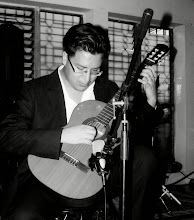Thoughts on the Massification and Commercialization
of Gregorian and Sacred Chants
By Carlos W. Murgueitio
Essay for the University of Pennsylvania
Gregorian and Sacred Chants have played an
important role in the history of music for centuries. Back in the time
the music was considered a way of connecting with a much higher
spiritual force or power, those chants provided somehow a bridge between
we Men and the Divinity, regardless of what religion one could preach
at the time. The quest for the Divine and the ultimate perfection and
balance is something we see in every art form, and music is not the
exception. In Christian and Non Christian (Hindi, Muslim, Buddhist,
etc.) early communities, sacred chants were the way composers translated
that desire to connect with the higher and universal divine root, and
somehow, through the music, bring to the listener a sense of deep
spirituality and reflection, something they may have experienced,
considering they did not have something we have in our modern world that
I call "The interference of technology in people's attention span". So,
as a consequence, the experience may have been more intimate, higher
and purest.
Considering the Study Case of the
commercial recording of a Gregorian Chant, makes me think from my
perspective as a listener, musician (I'm a composer and piano /
classical guitar player), and man seeking answers through spirituality.
From my perspective as a listener, it makes me wonder how it is
affected. While listening the recording made by the German Monastic
Monks, the music is there, the monks are there singing, but the
intention (connecting the soul with a Higher Power / God / Universal
Force) seems lost, to me at least. I believe this happens because the
intention has changed, it is no longer about enhancing the listener's
spiritual experience, but rather, an economic exercise of popularity
and revival of "some old interesting stuff" as it usually is seen by
younger people in most cases.
From my perspective as a musician and
composer, the monks seem to not understand the intention of the composer
of the chant and just take it as an exercise of perfect technique and
pitch. They ceased to be monks, and they became performers. I am not sure how Gregorian / Sacred Chants
were sang in the times they were released because I wasn't there, but
there is clearly a difference in the final sonic result when something
is not made for financial reasons, but for spiritual growth reasons.
And
this leads me to my perspective as a man seeking answers through
spirituality: Once the original intention (Enhancement of the Spiritual
Experience) is gone, and it's replaced by a new one (Massification,
which I am not saying is bad) you may be able to sense it, and as it
happened in my case, feel nothing at all but sadness because a sacred
composition has changed its nature to a commercial product. By no means I
am a purist (musically or spiritually) but nevertheless, the spiritual
realm and the mundane fast-moving economic world are two separate
things, and they should remain like that.


No comments:
Post a Comment